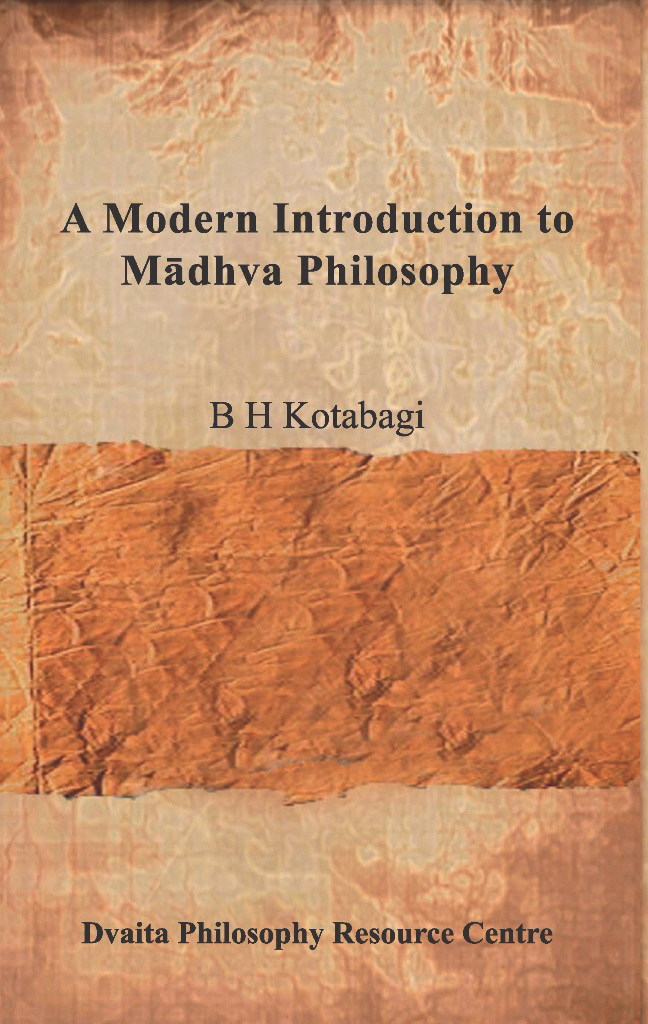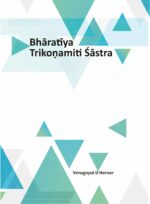A Modern Introduction to Madhva Philosophy
₹475.00
The author has made this treatise on Madhva’s realistic school of Vedānta philosophy convincing to the modern mind by employing western logical apparatus in substantiating Madhva’s ideas. Following the Indian classical tradition, the author has examined the validity of Advaitavedānta, the Absolute Monism of Śaṅkara and Bhāskara as Pūrvapakṣa, and logically proved its inconsistencies. He has then established the Dvaitasiddhānta i.e., the Monotheistic Dualism of Madhva. He has successfully brought out the nuances of the realistic school of Indian philosophical thought in this work. A Modern Introduction to Mādhva Philosophy is Prof B H Kotabagi’s posthumous publication.
Interested customers may write to us at mup@manipal.edu about purchasing the book.
| Also available on |
Out of stock
| Category: | General Interest |
|---|
Related products
-
A Bond So Sacred
₹450.00A Bond So Sacred tells the story of Raman, a satyagrahi, who adopts Kokila, an orphan. He leaves the five year old in the care of his mother while he plunges into the freedom struggle. His nationalist fervour, however, clashes with his love for Amina, his charming neighbour who wants parental approval to their marriage. Raman’s mother is as staunch a Brahmin as Amina’s father is a Muslim. Will Raman be able to get their consent? The joy of India becoming an independent nation is marred by Gandhiji’s death. Raman’s fellow satyagrahis have gone their ways and he finds himself with no role to play in a rapidly changing country. Meanwhile, Kokila, his protégée, has her own battles to fight. As the years bring them together again, Kokila discovers truths about Raman that she would never have imagined. She is forced to confront the ghosts of the past, his and hers.
-
The Other Face
₹550.00Author: Na Mogasale Translator: N T Bhat
Set in a fictitious village called Kanthapura in Kasaragod district, Mukhāntara spans across the life of seven generations of a Havyaka Brahmin family. A story about the realities of living in a society marked by caste distinctions, the desire to find communal harmony and the tribulations of the characters through the entirety of the novel, it is also a tale of changing times and people. After unexpectedly coming into possession of a huge portion of land, Thirumalēshwara Bhat of Īshwarīmūle becomes a satisfied man. But childless, Thirumalēshwara Bhat and his wife Pārvathakka decide to adopt Venkappaiah and also give shelter to his widowed mother, Rathnamma. Venkappaiah is to inherit Thirumalēshwara’s vast wealth but when Krishnaiah, the illegitimate child of Thirumalēshwara and Rathnamma is born, rivalry ensues. Through the overlapping narratives of the characters, we get a glimpse into their journey from tradition to modernity. The characters strive to reshape new values when old values are slowly questioned and erased as they move on and are swept along in the waves of globalization.
Also available on

eBook available on

-
Retro India
₹350.00Retro India is, in essence, a trip down the memory lane, meandering through the sixties, seventies, eighties and nineties of the twentieth century. Today?s youth would battle with the fact that India had experienced a sweeping change from what it was in just as recently as thirty years ago. What kind of a moribund economy could engender a continuing state of shortages, high inflation, low growth, a paucity of jobs, rampant smuggling, and a foreign exchange situation that was perpetually perilous! It took major political and economical transformations to remove the shackles that then bound the economy. This narrative provides a clear bridge between the then and now for the younger generations. And for the older reader, it provides a heap of nostalgia. In the latter half of the twentieth century, the changes in India have been vast and comprehensive. In these decades, economic indicators such as India?s growth in GDP rate, the proliferation of the number of Airlines in the Indian skies, the multiplying of car models, the flourishing of telephone connections and moving on to the world of mobiles, televisions going colour from black and white to operating with over a thousand channels, India turning digital, and so on clearly directs that India had taken a crucial turn in its history. India has changed. And how! The Indian consumer grins. This is notwithstanding the fact that poverty is endemic and the gulf between the rich and the poor
-
Bhāratīya Trikoṇamiti Śāstra
₹550.00Indian Trigonometry was developed as a powerful mathematical tool for Siddhantic Astronomy. The book, Bharatiya Trikonamiti sastra (Hindu Trigonometry) deals with all the relevant topics of Indian trigonometry, including trigonometrical identities and other formulas, trigonometrical tables, methods of interpolation and trigonometrical series, etc. The subject matter is discussed in eleven chapters divided into 80 sections and 50 sub-sections, involving translations of 250 verses spread over in 38 classical Sanskrit works and based on 42 research articles published in 16 research journals. By including material of the late Aryabhata School or Kerala Aryabhata School, the author has made the book comprehensive and up-to-date. Indeed, the book is fascinating and significant. It is a definite contribution in the study of the history of Indian mathematics. The book is the English version of the Kannada book of the same title.
-
The Practice of Geopolitics
₹850.00Intended to be a Practioner?s Guide to Geopolitics, the book provides a look into the thought processes that generate correct and timely analysis of global events. Geopolitics needs to weave within its analytical grasp economics, society, strategy and even culture, as the science deals with overall national capabilities as well as the mutal synergy and frictions between nations. Although a broad range of subjects has been covered in the book, each is anchored in the ground reality of events having a profound impact on the lives of citizens and on world events. The growing interconnectedness of the globe has resulted in a need to do away with the popular west centric models of international relations and to view events not through that single prism but from a holistic viewpoint that accepts the relevance and maturity of different histories and geographies. What the book provides is an alternativeWeltanschauung to the dominant models of geopolitical analysis, so that the science is enabled to cross beyond the narrow boundaries which have confined. The scope and applicability of its analysis. The rise of Asia needs a geopolitical vision unique to the continent, and this is what has been provided by Professor Nalapat.
-
Post Googlism and Other Short Stories
₹350.00This collection of short stories is for the fast-paced millennials, whom the author calls ?The Post Googlist Generation? who want everything hastily, at their finger-tips and on the go. The language has also shrunk in size to allow the pace. The world-view of this generation is that what cannot be done through an app cannot and should not be done. Their expectations of a story are a striking start, a quickly built middle and an interesting end. Stories in the collection seek to meet these expectations of this generation talking to them in their own language. They also echo the changing lives and changing aspirations of the time.
-
Dhvani and Epiphany: Essays in Criticism (12 Essays)
₹270.00Dhvani and Epiphany examines the work of major Indian poets like Nissim Ezekiel and Arun Kolatkar; the struggle of young poets to find an audience; and the art of fiction. But its main focus is on the nature of creativity. How does an artist communicate his meaning? What makes a work genuinely creative? Through a sensitive exploration of poetry ? ranging from the simple poems of a child, Poorna Prajna, to the complex ?Byzantium Poems? of Yeats ? the first seven essays try to show how a poem comes to life when it speaks to us and we listen to its dhvani and respond. Even in fiction, it is not all realism. There is irony in exploring the paradoxical nature of reality; events taking on symbolic overtones; and epiphany, moments of illumination and insights ? when surprising correspondences are seen. Writers cannot surprise and delight their audience if they themselves are not surprised and delighted by such insights.
-
Ancient Stone Riddles: Megaliths of the Indian Subcontinent
₹185.00Ancient Stone Riddles is an introduction to the fascinating but less-known monuments called megaliths in the context of the Indian subcontinent. The book seeks to present the current understanding among archaeologists and other researchers in a lucid manner to the general reader, while stimulating thought on the many questions that linger about these remnants from our distant past and the people and cultures that built them. It also discusses recent research about the knowledge systems possessed by the megalith builders, including the possibility that some of these monuments were erected to observe celestial cycles.
Interested customers may write to us at mup@manipal.edu about purchasing the book.
Also available on










